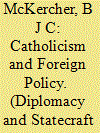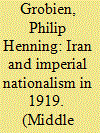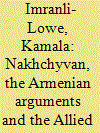| Srl | Item |
| 1 |
ID:
178363


|
|
|
|
|
| Summary/Abstract |
Esme Howard, the British diplomat posted to the Paris Peace Conference to handle policy towards North and Northeastern Europe, saw his proposals except for the Polish Corridor largely ignored by David Lloyd George, the prime minister, and his advisors at Downing Street. The two men had decidedly different conceptions of post-war Poland: Howard plumped for a large Poland with adequate territory and economic resources to counter the certain revival of Britain’s adversaries Germany and Russia; Lloyd George looked for a smaller one to appease republican Germany and Russia whether the latter became ‘Red’ or ‘White’. It has been suggested that as Howard was Roman Catholic, he looked to support reborn Roman Catholic Poland as much as he could. Such assertions are incorrect. Before and after 1919 in his various postings, he always put British interests above all else, even in Catholic countries in which he served. His advice at Paris was to ensure smaller Powers like Poland and the Baltic States could with British support maintain a regional balance of power against Britain’s Berlin and Moscow. Lloyd George lacked any strategic vision in seeking to ameliorate differences with the Germans and Russians.
|
|
|
|
|
|
|
|
|
|
|
|
|
|
|
|
| 2 |
ID:
170295


|
|
|
|
|
| Summary/Abstract |
During the First World War, France and Britain forged the most intimate and comprehensive political, economic, and military alliance in history. The contributions of Britain and its Empire had been vital to France’s survival as a Great Power. A continuation of the wartime Entente was therefore pivotal to a wider strategy of embedding French security in a trans-Atlantic community of democratic Powers including the United States. But neither Britain nor the United States were ready to commit to using force to uphold the European order established at Paris. British political and policy elites reverted to pre-war cultural reflexes that prioritised Imperial considerations and assumed that France posed the chief threat to British interests.
|
|
|
|
|
|
|
|
|
|
|
|
|
|
|
|
| 3 |
ID:
177700


|
|
|
|
|
| Summary/Abstract |
Interposed between the Constitutional Revolution and the rise of Reza Khan, Iran began a foreign diplomacy that asserted a nuanced nationalism. After the devastation of the First World War, Iran sent a commission to the Peace of Paris. There, Iran put forward a nationalist programme which sought a sovereign and independent Iran, and the return of territory lost since 1828. Whilst many facets in this nationalist programme had been articulated before 1919, it is the consolidation within one programme which makes this programme unusual. It was also the first time such a great number of specific territorial claims were made. This imperial nationalism, requires an assessment within the narrative of Iranian nationalism, and will be explored in this article.
|
|
|
|
|
|
|
|
|
|
|
|
|
|
|
|
| 4 |
ID:
146782


|
|
|
|
|
| Summary/Abstract |
The article explores the territorial conflict between Armenia and Azerbaijan over the Nakhchyvan region after the South Caucasus came under the Allied control following the Mudros Armistice of 30 October 1918. It analyses the arguments of the Armenian Government submitted to the Paris Peace Conference in 1919 to substantiate its vision of territorial delimitation between the two republics with regard to Nakhchyvan, examines the positions of Azerbaijan and Armenia and the Allied Powers on the Nakhchyvan problem and assesses the impact of their stance on the settlement of the issue. It argues that the Armenian claims to the region were land-related, being part of the Armenian nationalist aim of constructing an expanded Armenia from the Mediterranean to Garabagh. It also argues that the Allied Powers were guided by their own interests while making proposals on the settlement of the conflict.
|
|
|
|
|
|
|
|
|
|
|
|
|
|
|
|